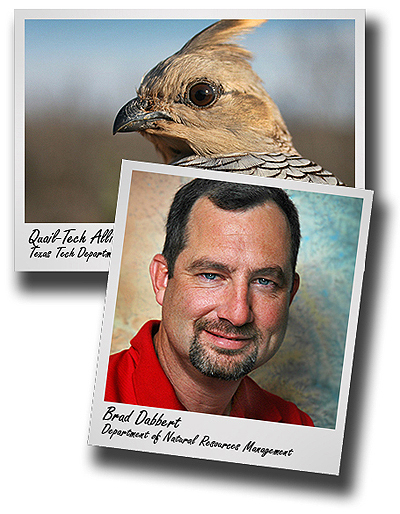Protracted drought cuts deeply into Texas quail numbers: Texas Tech study

The drought and a killing heat that gripped Texas for the better part of a year has sharply reduced quail numbers with the die-off of adult game birds ratcheting up into the hundreds of thousands, followed by pint-sized chick reproduction reports.
A new study of 28 ranches covering 1.6 million acres by Texas Tech wildlife biologists has found a 40 percent decrease in last year's covey count. The lingering drought in Texas left millions of quail short of drinking water and damaged large tracts of rangeland habitat. Last year, Texas has received less than half its normal rainfall.
"This isn't good news, but it's not unexpected given the reduced rate of nest initiation and extremely low chick survival we've documented this past breeding season," said Brad Dabbert, a game bird biology expert and an associate professor with Texas Tech's Department of Natural Resources Management.
Climatologists say this year's dry spell is the worst one-year drought since Texas began keeping rainfall records in 1895, and they predict that the cause of the drought, the weather created by the Pacific current called La Nina, may well extend into next year.
"Given the reduced numbers, it's extremely important to shepherd as many birds as possible through the winter and spring," Dabbert said. "We're suggesting that landowners provide a milo feed supplement. In addition, we recommend severely curtailing or eliminating bird hunting this year."
The wide ecological impact of the drought can be seen in quail habitat. Ron Sosebee, a 40-year expert on battling back the brutal effects of Texas' droughts and a professor emeritus with Tech's Department of Natural Resources Management, said landowners have to make a difficult decision of moving stock to leased land, or, if necessary, selling the animals.
"Buying hay and keeping the livestock on the rangeland doesn't accomplish the goal of protecting rangeland," he said. "Livestock continue to eat the few grasses that are left, ultimately destroying the rangeland and the quail habitat. It's a difficult decision to make, but we must adjust livestock numbers now."
The scant rains have had an effect on the youngest of the quail. A year-long study on Texas' legendary 275,000-acre 6666 Ranch near Guthrie found that providing extra food was one of the few means for improving adult northern bobwhite survival and nest initiation.
"Unless supplemental feed was provided as a food source, there was very little chick production on the ranch," said, Byron Buckley, a natural resources management graduate student working on Dabbert's research team. "We found a 35 percent survival rate on areas where feed was supplied, compared to a 17 percent survival rate on areas that didn't receive feed," he said.
Even before Texas' devastating drought, quail were already in trouble. Four years ago the National Audubon Society listed the Northern Bobwhite Quail as the No. 1 common bird in decline. From 1967 to 2007, the bird's population decreased from 31 million to 5.5 million.
"They're declining everywhere, but quail numbers are higher here in the Rolling Plains than other parts of the country," Dabbert said. Finding reasons for the overall declining quail population and strategies to reverse the trend was the impetus behind a massive research project, known as the Quail-Tech Alliance Research Initiative.
As part of the project Texas Tech is partnering with some of state's storied ranches and smaller rural properties. Launched in January 2010, it's expected to encompass 22 million acres in a 44-county area in west central and northwest Texas.
Written by Norman Martin
CONTACT: Brad Dabbert, associate professor, Department of Natural Resources Management Texas Tech University at (806) 742-2842 or brad.dabbert@ttu.edu
0110NM12
Editor's Note: For more on the Quail-Tech Alliance project, click http://www.quail-tech.org
Davis College NewsCenter
-
Address
P.O. Box 42123, Lubbock, Texas 79409-2123, Dean's Office Location:Goddard Building, Room 108 -
Phone
(806)742-2808 -
Email
kris.allen@ttu.edu
